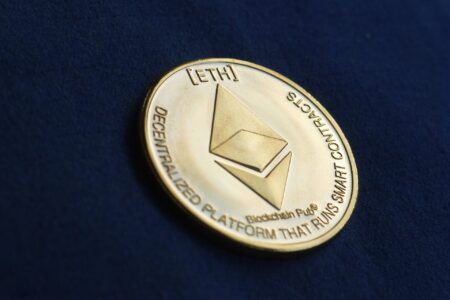In Ukraine, years of political unrest have created a welcoming habitat for cryptocurrency miners and startups. The collapse of the state currency, the hryvnia, has created a massive demand for alternatives.
Also, as a result of the struggling economy, rent and power are both cheap, and there is an abundance of skilled workers and engineers in the area seeking employment. This week, Bloomberg reported that over 100,000 Ukrainian engineers contract remotely for Silicon Valley companies.
In a place where the average monthly salary is $300, the crypto industry is giving thousands of people opportunities to rebuild their lives.
Michael Chobanian, the “father” of Kyiv’s crypto community, explained that people are more open to experimenting with alternatives in these desperate times. Chobanian said:
We are in the top five in terms of corruption. We have a war going on. The economy is shattered. So basically what I’m trying to say is that we have absolutely nothing to lose.
One of the country’s early crypto adopters, Oleksii Mushak, even made his way into the post-revolution parliament. Mushak is still an advocate for cryptocurrency, and despite his political credentials, he thinks that this technology can free people from oppressive governments.
“It’s about not believing in the state,” Mushak says, adding that fighting oppression “is what Ukrainians have been doing for the last 1,000 years.”
Mushak is hoping to work with the blockchain community in regulating the industry, but generally, the country’s new government has not been entirely friendly to crypto. This year, authorities have shut down hundreds of mining operations and raided multiple crypto-related businesses.
Pavel Kravchenko, co-founder of Distributed Lab says that the system needs an entire overhaul, not just a rearranging of leaders. Kravchenko said:
You can’t just change the president and decide there will be change. You have to change the whole structure. You need a different mentality.
Ukraine’s crypto revolutionaries are working on changing the whole structure by using their wealth to improve the society, and encouraging local merchants and residents to adopt the technology. Hundreds of vendors in the country accept dozens of different cryptocurrencies, making it one of the easiest places in the world to spend crypto.
Blockchain developer Andrey Khavryuchenko says that the industry should help build a new society while resisting the influence of politicians. Khavryuchenko said:
We need to organize to improve the roads, the infrastructure, the public utilities. Bitcoin and guns, that’s the only way to save this country.
When asked if his words would seem scary to some people Khavryuchenko responded: “Not scarier than 100 years of oppression. I have to prepare for these contingencies. It’s not whether it will happen, it’s when.
The New Era of Safe Haven Currency
Ukraine is not alone, many other countries with struggling and collapsed economies have also found a safe haven in cryptocurrency markets.
Last month, CryptoGlobe reported that cryptocurrency is quickly becoming a preferred medium of exchange in Venezuela. Crypto has become so popular in the country that the government has announced that they will be running their new national currency on a petro-backed blockchain.
Cryptocurrency will become more and more relevant as the fiat currencies issued by governments continue to collapse, and as we have seen in states such as Venezuela, governments will attempt to co-opt the technology and implement their own blockchain currencies, which will likely not have the privacy features that crypto enthusiasts have come to expect.
The Philosophy of Decentralization
Decentralization has become somewhat of a buzzword in the crypto community, but it has a very intentional meaning that goes back years before Satoshi Nakamoto. While Satoshi Nakamoto is the famous elusive pseudonym behind the creation of bitcoin, there was a subculture of hackers and anarchists who laid the foundation for the technology. This group called themselves the Cypher Punks, and they extensively theorized the concept of anonymous digital money. They also believed that it could be a tool to subvert central banks, and ultimately replace them.
In fact, Timothy May, a senior scientist involved in the early years at the Intel corporation predicted the rise of cryptocurrencies and smart contracts in his 1994 manifesto “The Cyphernomicon.”
In the book, May prophesized about “sophisticated financial alternatives to the dollar, various instruments, futures, forward contracts, etc.”
In chapter 16, May speaks of “Using software agents for money laundering and other illegal acts,” and goes on to say that:
These agents act as semi-autonomous programs that are a few steps beyond simple algorithms. Real use could be as “digital cutouts”: transferring wealth to other agents (also controlled from afar, like marionettes.) [The] advantage is that they can be programmed to perform operations that are perhaps illegal, but without traceability….The rise of AMIX-style information markets and Sterling-style “data havens” will provide new avenues for money laundering and asset-hiding. Information is intrinsically hard to value, hard to put a price tag on (it varies according to the needs of the buyers) meaning that transnational flows of information cannot be accurately valued (assigned a cash value.)
Earlier this year, May gave a presentation at the hacker house Paralelní Polis in Prague where he recalled seeing Satoshi’s now-famous white paper appear on one of his mailing lists. May explained:
In the mid-2000s, around 2006-2007, a lot of people began revisiting digital currency. In 2008-2009 through the ‘cryptography mailing list’, the successor to the ‘cypherpunk’s mailing list,’ a person going by the name of Satoshi issued a white paper proposing a system which solved the Byzantine consensus problem in a novel way using Proof-of-Work.









